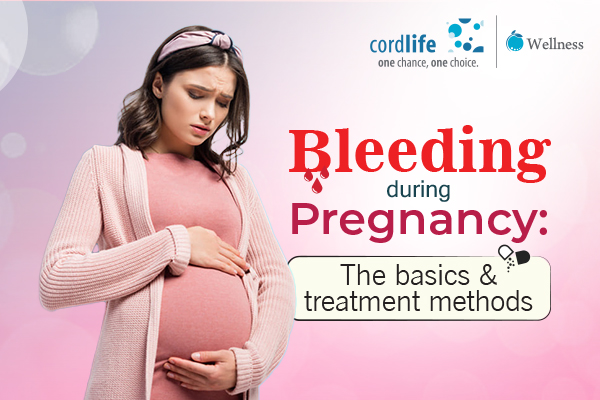Table of Contents
- Is Bleeding Normal During Early Pregnancy?
- Implantation Bleeding During Pregnancy
- Hormonal Bleeding During Pregnancy
- Molar Pregnancy
- Ectopic Pregnancy
- Subchorionic Hematoma
- Pregnancy Loss or Miscarriage
- What Are The Causes of Bleeding During the 2nd and 3rd Trimesters?
- How Do You Know Whether It Is Spotting or Bleeding?
- How Is Bleeding During Pregnancy Treated?
You may be in your first trimester or second trimester, even slight bleeding, it’s natural for you to be scared and worried about the baby. Consult your doctor immediately, to determine whether bleeding during pregnancy is normal?
Basically, vaginal bleeding during pregnancy is any form of bloody discharge from the vagina. This can occur from the time the egg has fertilised till the end of your pregnancy. While bleeding during your early pregnancy is common and doesn’t cause you much problem, bleeding during the latter part of your pregnancy might be more serious.
Also explore the reasons for bleeding during your pregnancy from the first trimester to the 3rd trimester.
Is Bleeding Normal During Early Pregnancy?
27% of pregnancies have been reported at least one episode of bleeding during the first trimester.
So, what are the reasons for bleeding during the first trimester of your pregnancy:
Implantation Bleeding During Pregnancy
1 or 2 weeks after the fertilisation when the egg attaches to the uterine wall, the process results in slight bleeding during your first trimester. This is often mistaken as period-like bleeding during early pregnancy, which is harmless. You’d often experience this kind of bleeding when your period is due.
Hormonal Bleeding During Pregnancy
If you’d experience light bleeding from 4 to 8 weeks of your pregnancy, that is when you have hormonal bleeding.
Molar Pregnancy
Once in a while, an empty egg gets fertilised and gets the father’s genes, leading to this rare condition known as a molar pregnancy. Up to 13 weeks, you might get bright red to dark brown bleeding in your first trimester. Complications may arise if you’re older than 35 years old and younger than 20 years old.
Ectopic Pregnancy
In this condition, a fertilised egg attaches and develops outside the uterine cavity. Approximately, 2% of you will suffer from this condition, during your first trimester. As a result of this condition, you might experience severe abdominal or pelvic pain with bleeding during the first trimester of your pregnancy.
Subchorionic Hematoma
This is one of the common causes of vaginal bleeding from 10 to 20 weeks of your pregnancy. 11% of you might fall under this condition, in which bleeding happens under the chorion membranes (The outer foetal membrane, next to the uterus) that protects the embryo in the uterus.
Pregnancy Loss or Miscarriage
Miscarriage during the first trimester of your pregnancy, can be one of the biggest reasons for bleeding. In this condition, you might experience light to heavy bleeding accompanied by cramps in your lower abdomen.
What Are The Causes of Bleeding During the 2nd and 3rd Trimesters?
Although the risk of miscarriage has diminished by the time you’ve stepped into the second half of pregnancy, you must take bleeding during the 2nd half of your pregnancy more seriously. All you need to do is understand the reasons for it:
Placenta Previa
This condition occurs when the placenta that aids in foetal development attaches to the lower part of the uterus, covering the cervix partially or fully. This condition causes severe bleeding near the end of the second trimester or the beginning of the third trimester.
Placental Abruption
This condition occurs before or during labour. In this condition, the placenta detaches from the uterine line resulting in bleeding accompanied by stomach aches.
Preterm Labour
Now as your body gets ready for labour, your cervix thins and opens, the mucus plug pushes out of the vagina resulting in light yellow or white colour vaginal discharge. However, if the discharge is thicker, it can be red, brown, or pink blood.
Bloody Show
This happens as a result of rupturing of the cervix. In fact, the bloody show has traces of mucus in it.
How Do You Know Whether It Is Spotting or Bleeding?
If you have placental problems, or maybe you are going through preterm labour, or must have suffered a miscarriage, you might experience heavy bleeding. Blood that’s bright red in colour is worrisome. However, a few drops of blood especially in your first trimester is spotting. Spotting is normal and you might not be very worried about it.
How Is Bleeding During Pregnancy Treated?
Remember, pregnancy is one of the most beautiful emotions in your life. Don’t let bleeding scare you. We know that too much blood loss would result in low haemoglobin level during your pregnancy which causes birth defects in your baby. However, follow your doctor’s advice when you get the signs of bleeding during your pregnancy. Your healthcare provider might suggest you avoid travel, take bed rest, get hospitalised, and have iron-rich food.
Also go through our blogs to gather some more knowledge on pregnancy, postpartum, babycare and cord blood banking.

